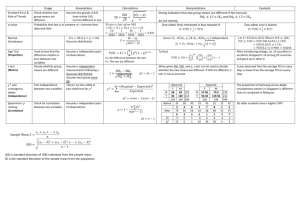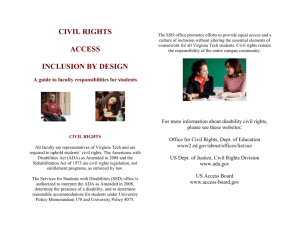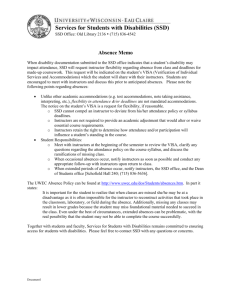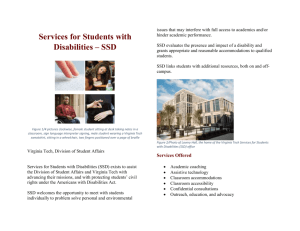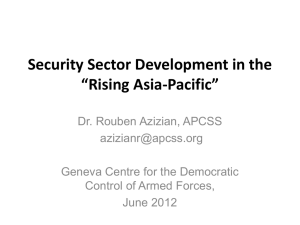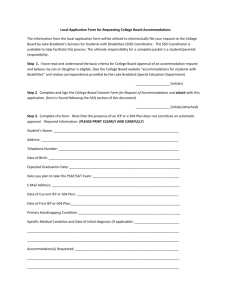SAT College Board SSD Extended Time Testing Application Directions
advertisement
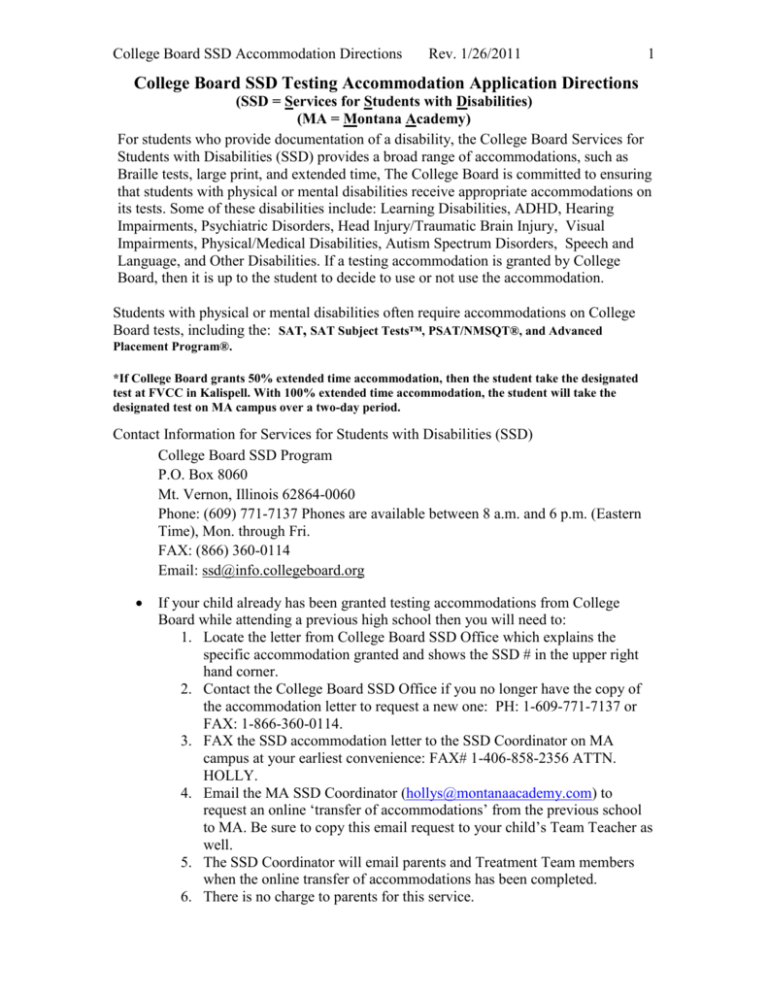
College Board SSD Accommodation Directions Rev. 1/26/2011 1 College Board SSD Testing Accommodation Application Directions (SSD = Services for Students with Disabilities) (MA = Montana Academy) For students who provide documentation of a disability, the College Board Services for Students with Disabilities (SSD) provides a broad range of accommodations, such as Braille tests, large print, and extended time, The College Board is committed to ensuring that students with physical or mental disabilities receive appropriate accommodations on its tests. Some of these disabilities include: Learning Disabilities, ADHD, Hearing Impairments, Psychiatric Disorders, Head Injury/Traumatic Brain Injury, Visual Impairments, Physical/Medical Disabilities, Autism Spectrum Disorders, Speech and Language, and Other Disabilities. If a testing accommodation is granted by College Board, then it is up to the student to decide to use or not use the accommodation. Students with physical or mental disabilities often require accommodations on College Board tests, including the: SAT, SAT Subject Tests™, PSAT/NMSQT®, and Advanced Placement Program®. *If College Board grants 50% extended time accommodation, then the student take the designated test at FVCC in Kalispell. With 100% extended time accommodation, the student will take the designated test on MA campus over a two-day period. Contact Information for Services for Students with Disabilities (SSD) College Board SSD Program P.O. Box 8060 Mt. Vernon, Illinois 62864-0060 Phone: (609) 771-7137 Phones are available between 8 a.m. and 6 p.m. (Eastern Time), Mon. through Fri. FAX: (866) 360-0114 Email: ssd@info.collegeboard.org If your child already has been granted testing accommodations from College Board while attending a previous high school then you will need to: 1. Locate the letter from College Board SSD Office which explains the specific accommodation granted and shows the SSD # in the upper right hand corner. 2. Contact the College Board SSD Office if you no longer have the copy of the accommodation letter to request a new one: PH: 1-609-771-7137 or FAX: 1-866-360-0114. 3. FAX the SSD accommodation letter to the SSD Coordinator on MA campus at your earliest convenience: FAX# 1-406-858-2356 ATTN. HOLLY. 4. Email the MA SSD Coordinator (hollys@montanaacademy.com) to request an online ‘transfer of accommodations’ from the previous school to MA. Be sure to copy this email request to your child’s Team Teacher as well. 5. The SSD Coordinator will email parents and Treatment Team members when the online transfer of accommodations has been completed. 6. There is no charge to parents for this service. College Board SSD Accommodation Directions Rev. 1/26/2011 2 If your child has not been granted testing accommodations from College Board prior to attending MA then you will need to: 1. Email the MA SSD Coordinator (hollys@montanaacademy.com) to request a ‘new application of accommodations’ giving your parental permission for the new online application process to begin. Be sure to copy this email request to your child’s Team Teacher as well. College Board may take anywhere from 5-7 weeks to process the application once it has been submitted online. New applications take hours to complete and weeks to process by College Board so please plan ahead in order to meet online test registration deadlines for upcoming College Board Tests. 2. Review the College Board list of approved tests used for documentation of specific student needs below: Commonly used tests that measure a student's cognitive abilities: Weschler Adult Intelligence Scale-III (WAIS-III) or Weschler Intelligence Scale for Children-IV (WISC-IV) Woodcock Johnson Psychoeducational Battery-III NU (WJ-III NU): Tests of Cognitive Abilities Stanford Binet Intelligence Scales-5th Edition (SBS) (When individually-administered) Kaufman Adolescent and Adult Intelligence Test or Kaufman Assessment Battery for Children, Second Edition (KABC-II) Differential Ability Scales, Second Edition (DAS-II) Reynolds Intellectual Assessment Scales Commonly used tests that measure a student's academic achievement: Reading Woodcock-Johnson-III NU: Tests of Achievement (General and Extended batteries that include fluency measures) Scholastic Abilities Test for Adults (SATA) Stanford Diagnostic Reading Tests, Fourth Edition (SDRT) (When individually-administered) Wechsler Individual Achievement Test (WIAT II) with reading rate measure Kaufman Test of Educational Achievement, Second Edition (KTEA-II) Gates-MacGinitie Reading Tests® (GMRT®) Fourth Edition (When individually-administered) Mathematics Woodcock-Johnson-III NU: Tests of Achievement (General and Extended batteries including fluency measures) Scholastic Abilities Test for Adults (SATA) Wechsler Individual Achievement Test II (WIAT II) Kaufman Test of Educational Achievement, Second Edition (KTEA-II) Stanford Diagnostic Mathematics Test, Fourth Edition (When individually-administered) Continued on page 3. Written Language College Board SSD Accommodation Directions Rev. 1/26/2011 3 Woodcock-Johnson-III: Tests of Academic Achievement (General and Extended batteries including fluency measures) Scholastic Abilities Test for Adults (SATA) Wechsler Individual Achievement Test (WIAT II) Test of Written Language III (TOWL III) Kaufman Test of Educational Achievement, Second Edition (KTEA-II) Commonly used tests that measure a student's information processing: Detroit Tests of Learning Aptitude-4 (DTLA-4) or DTLA-A (Adult) WISC IV WAIS-III W-J-III-Tests of Cognitive Ability A low processing speed score alone, however, usually does not indicate the need for testing accommodations. In this instance, what would be important is to include in the documentation an indication of how the low processing speed affects a student's overall academic skills. Tests not accepted by the College Board The following tests are screening tools and, without other measures, do not meet the psychometric criteria to diagnose a disability or establish the need for testing accommodations: Cognitive WASI Reynolds Intellectual Screening Test (RIST) Slosson Intelligence Test-Revised KBIT-2 Woodcock-Johnson III - Brief Intellectual Ability (WJ-III-BTI) Academic Wide Range Achievement Test 4 (WRAT 4) KTEA-II Brief Form 3. Fax recent complete psychological and/or academic testing reports for your child to the SSD Coordinator at your earliest convenience: FAX# 1406-858-2356 ATTN. HOLLY. 4. Email the SSD Coordinator (hollys@montanaacademy.com) if you do not have a copy of recent complete psychological and/or academic testing report so the SSD Coordinator can begin the in depth process of studying the child’s chart to gather supporting documents for the online application. 5. The SSD Coordinator will email parents and Treatment Team members when the new online accommodation application has been submitted. 6. There is no charge to parents for this service. ***End page for College Board SSD Testing Accommodation Application Directions ***
